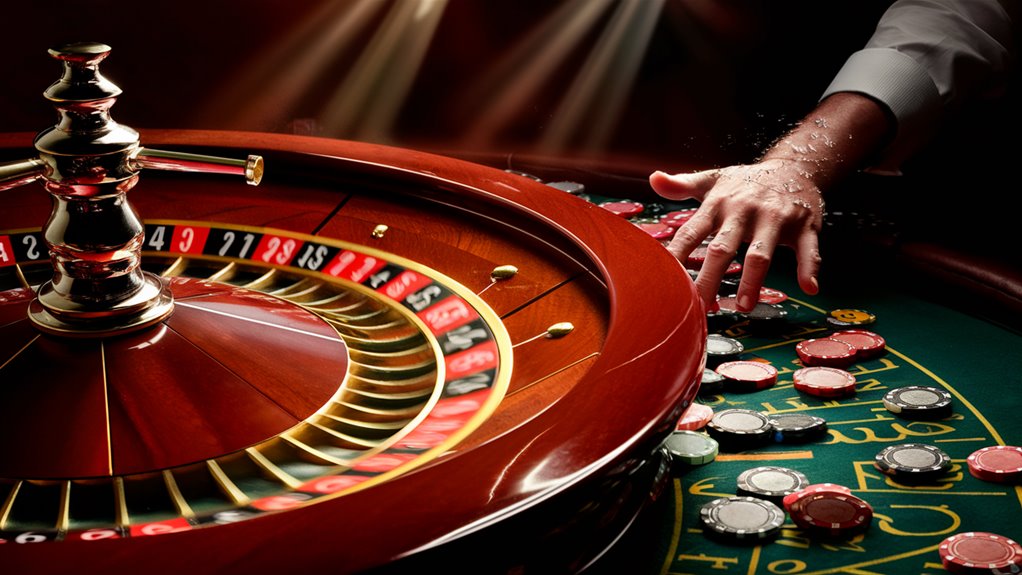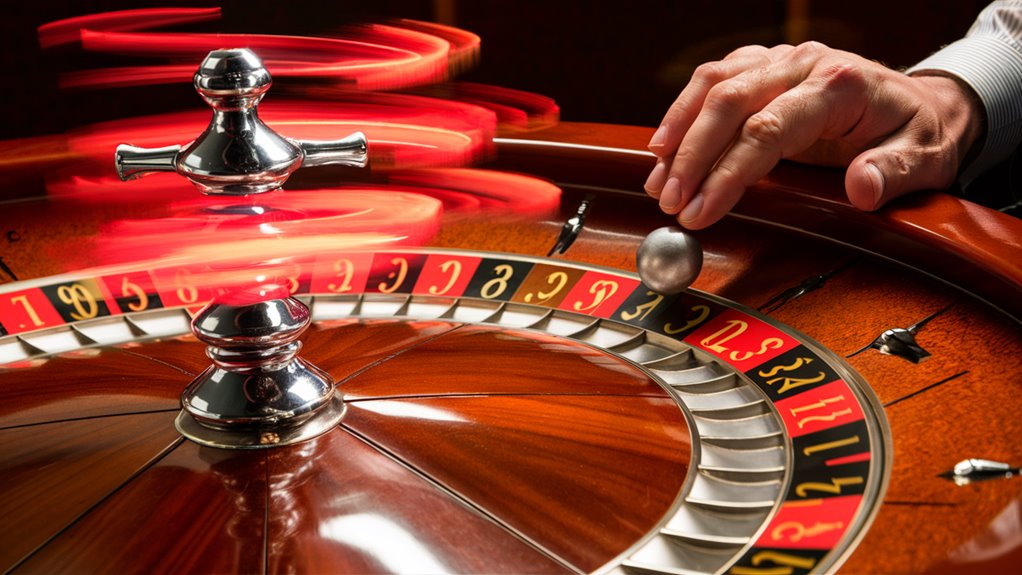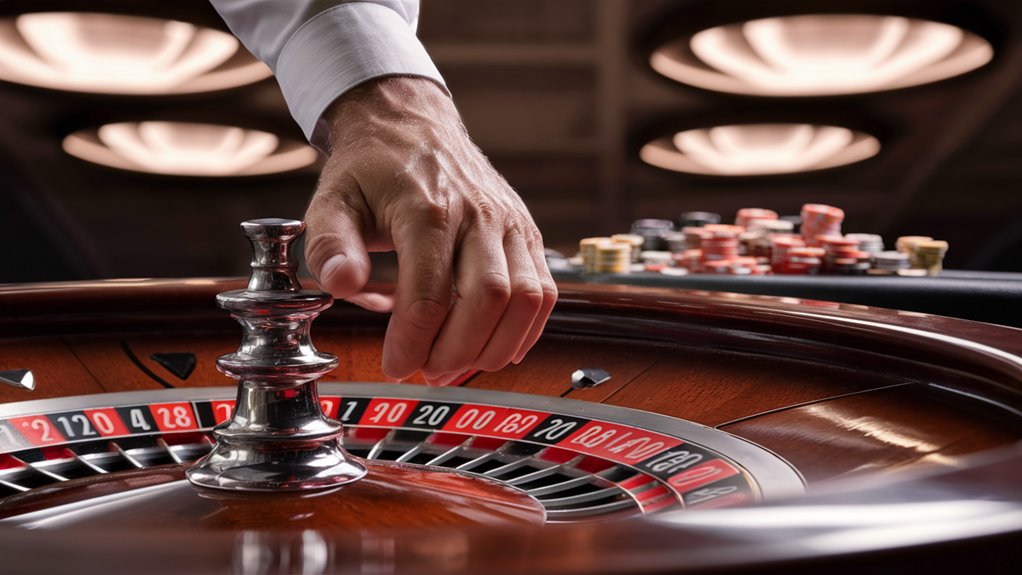
Mind Game of Roulette: Key Mind Points

How it Hits the Brain
The cool game of roulette fires up big brain waves in players through many mind tricks. When bets are on, the brain lets out a lot of happy juice, making players feel good, just like in some habits that are hard to kick. These brain sparks get wild when you almost win, pushing you to play more.
Thinking Traps and Choices
Players often face the better’s mistake, a messed-up thought making them think what happened before changes what happens next even though the shot of winning stays at 48.6% for red/black. This mind mess leads to nutty betting ways. The brain likes to see links that aren’t really there.
Place and People Power
Casino Setup Effects
The smart setup of a casino 공식 검증 방법 보기 messes with your head big time. The right lights, sounds, and space make you take bigger risks. All these, mixed with who you’re with, make you act out of norm.
How Others Affect You
Group vibes and the push from pals at the roulette table can make you bet brave. You might take bigger leaps in bets than you would if you were by yourself.
Memory and What You Think You See
Seeing just what you want plays a big part in how players think back on their roulette runs. Minds hold onto wins and forget the fails, warping what really went down. This is why many keep a sunny view even when the math is not in their favor.
How It Shakes Betting Plans
Knowing these head games shows why normal bet plans crash against the home’s edge. No stack of math can beat the set odds and mind bends in roulette.
About the Better’s Mistake
The Head Game with Random Happenings
The Better’s Mistake is a basic mind warp messing up choice plans in chance games.
Players often trip into this mind trap by wrongly thinking past rolls change what’s next.
When random rolls make a chain, like many red numbers one after another in roulette, players may wrongly guess black is due next.
Real Math vs. Usual Wrong Ideas
In games like roulette, every roll is a fresh event with steady odds.
On a one-zero wheel, black’s odds stay at 18/37 (48.6%), no matter what happened before. This solid math fact fights the usual wrong view that rolls will “even out” over plays.
Chance Standing Alone in Play
The idea of events not tied to each other is key for knowing odds in play.
A roulette wheel has no memory or fix-up ways – it can’t “sort itself out” or change odds based on past rolls.
This base rule of odds theory shows why the Better’s Mistake leads to wacky bet choices and money loss.
What You Should Know:
- Each game’s chance is on its own
- Old turns don’t change what will happen next
- Odds stand firm
- Grasping the stand-alone nature stops silly bets
Thinking Traps in Roulette
Getting the Thinking Traps in Roulette: A Full Guide
Common Mind Snares in Betting
The Better’s Mistake is one of many strong mind snares that twist roulette players’ choices.
Only seeing what suits you shows up when players recall only wins while playing down fails, messing up how well they think they’re doing.
Players often look for betting patterns that fit their game plans while ignoring facts that don’t.
The Head Game of Control in Casino Games
A big mind mess-up is the feeling of being in control in roulette.
Even though roulette is all about chance, players make complex bet ideas and habits, thinking wrongly these can change random outcomes.
Usual signs include picking certain numbers, timing bets, or doing lucky moves before playing.
Noticing Patterns and Betting Ways
Hot hand wrong thought and anchoring trap deeply mess up betting calls at the roulette table.
The hot hand trip makes players think good runs will never end, while anchoring makes them stick to old lucky numbers or betting paths. These mind snares often get worse with stress or after bad runs, making bets more and more off track.
Smart Mind Moves in Roulette
Knowing these thinking snags helps better your roulette game.
While this head know-how can’t change the math odds, it lets players choose smarter and keep cool heads during the game.
This key know-how is top-notch for safe play moves.
The Mind Works in Roulette: Joy Juice and More
How Your Head Reacts to Playing
Head stuff is basic in roulette play acts through joy-juice-run reward cycles.
As you bet and wait, your head lets out joy juice – a top mind link to fun and looking forward to rewards.
This body mess-up makes a strong mind loop that ups roulette’s hook.
Less Sure Rewards in Casino Games
The not-knowing rule in roulette kicks off a happening known as changing reward timing, giving off more joy juice compared to sure reward paths.
Each win at the roulette table lets out floods of this fun-making brain stuff, while almost-wins oddly make you want to play more.
The moving ball makes a big rush through this spot-on mind thing.
Brain Roads and Choices
Your brain’s reward spot works the same with planned or luck wins, using the same brain roads no matter the skill in it. This head act can beat cool choice moves, pulling players to chase what’s lost or keep playing as risks grow.
The joy juice reward loop builds a strong mind wall that hits a player’s power to stop playing high.
Head Game in Casino Playing

The Head Game of Almost-Wins and Loss Moves
Almost-win feels shape how you bet at roulette tables, setting off head responses that treat close hits like real wins.
This head trick builds a feeling of being in control that backs up more play even as you lose more.
Chasing What’s Lost and Choice Plans
Going after what’s lost is a key mind way in the play head game, rooted in chance ideas.
Players show a big feel for losses over same-size wins, leading to more risky betting paths. This mess-up adds to the better’s trick, making players wrongly think past plays change what’s up next.
How Others and Pressure Change Choices
The casino spot messes with your how risky it feels through many mind triggers:
- Quick choice needs
- How pals push you
- Choices when charged up
- Less noticing of loss when high on feels
Players under these hits often show bigger risky bet moves, as being with others makes mind states that skip cool thoughts.
These head tricks deeply twist how you bet, making knowing your own mind a must to keep smart control during plays.
Getting these moves helps spot and fix possible play mess-ups.
Getting Almost-Wins and Brain Acts in Play
The Mind Works Behind Almost-Win Feels
Almost-win times in play make certain brain parts light up much like they do during real wins, making a strong head effect that messes with how you play.
Main Brain Spots and Brain Doings
The reward road and feel part show a lot of action during almost-win times, playing big roles in:
- Looking forward to rewards
- Feeling processing
- Choice results
- Backing up acts
Joy Juice Acts and Play Moves
Joy juice system ups during almost-wins are more than with clear fails, making a big mind feedback circle.
This bigger brain move helps get why players keep on playing even with losses in hand. The brain reward setup sees these close tries as signs of coming luck, keeping up the play.
Old Help and Now Trouble
This brain move grew as a help trait, pushing to keep going in almost-there stay-alive acts.
But, in our now times, in play spots like casinos, this same setup may cause trouble. The brain’s reward ways wrongly see almost-wins as getting-better signs or wins coming soon, which may lead to:
- Longer play times
- More leaps in risky moves
- Hard time keeping cool choices
- More open to play-hook risks
Knowing these brain roads and how they mess with acts is a must for keeping control during play times and building good safe play plans.
Social Ways of Roulette: Knowing Table Acts and Head Game
Group Head Game at the Roulette Table
The being with others feel of roulette sets up clear head patterns that twist how players act.
How you bet often changes based on what everyone at the table does, with players tweaking their game plans responding to others’ moves.
When someone sees a big win, a catching from others thing happens, making those near up their bets or try winning moves too.
Risk Feels and How Others Lead You
How brave players are shows big changes based on who’s around.
Research finds that loners often keep to safer bet paths when it’s just them and the game runner.
But, with a lively bunch, risky moves jump big time. This change comes from group okaying and spread-out blame, where being in a crowd makes bigger risks seem normal.
The Game Runner’s Role in How You Act
The casino runner is key in how the table feels, with shows pointing that fun talks with the runner can keep players around much more, up to 37%.
The table vibe makes a group feels journey, where players often share how they react to what happens.
This together-act pumps up both good and bad results, making a joint feels trip that shapes the roulette time.
Key Social Bits:
- Group bet sway
- Risk feels change
- Runner-player ties
- Group feels show
- Group okaying effects
Mind Moves for Safe Play
Building Mind Strong Points for Safe Fun
Setting firm cash and time walls is core for playing safe.
Making written lines before you hit any casino game is key to keeping head control. These set walls should stay hard and fast, no matter if you’re on a win or lose run.
Knowing Your Feels and Keeping Yourself in Check
Keeping an eye on your feels directly shapes choice quality at the play table.
Using a planned half-hour check helps players see where their head’s at and if they should keep going or take a break. Spotting key red flags like being mad, worried, or too pumped means you need a quick stop. Exploring the Best Payment Options for Online Gambling
Building a Smart Mind View
The Watcher Way
Taking a step-back watcher view shifts playing from a possible cash worry into just fun.
Keeping track of sessions and making a clear win/lose log give valuable facts that help you see the big game waves. This smart look effectively stops usual mind traps like:
- Better’s mistake
- Chasing losses
- Result-tied thoughts
Knowing that each play moment is its own thing, apart from past plays, backs up smart play ways and backs better play habits.


